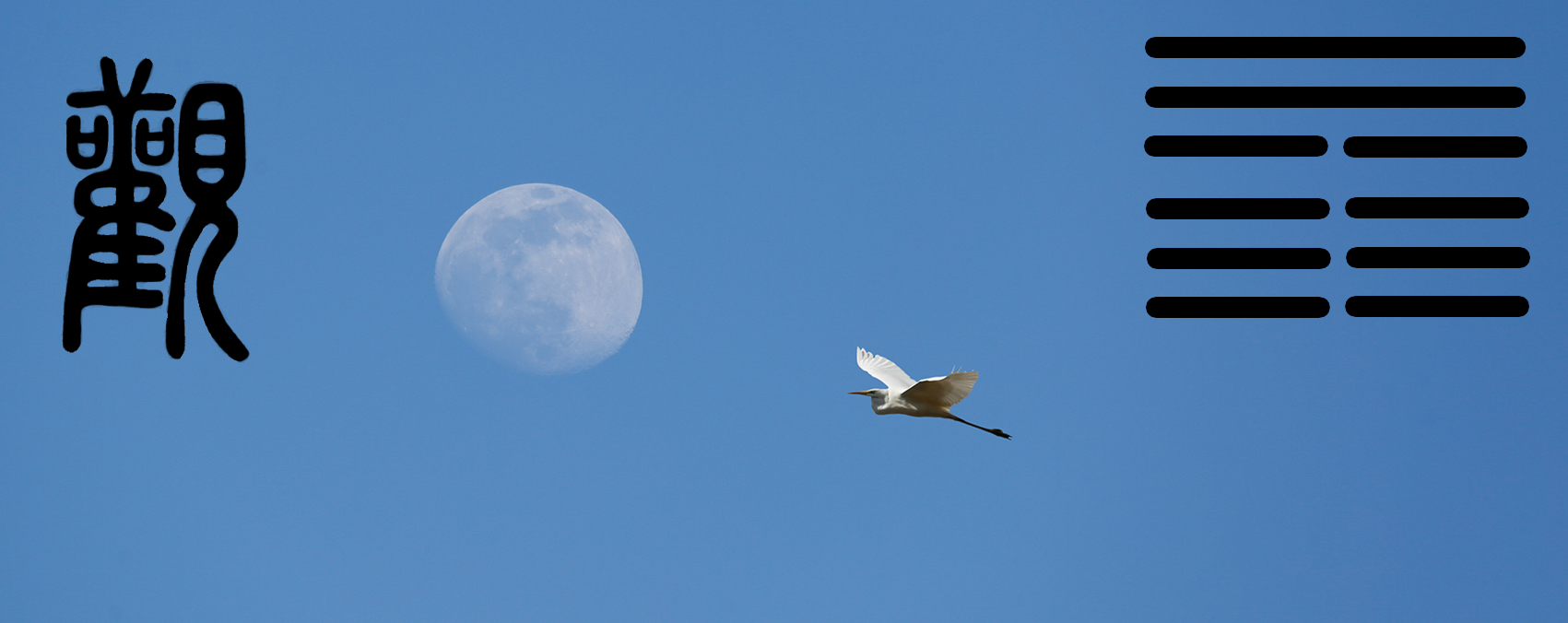Wind above – Earth below
The Chinese name of this hexagram is Guān, which translates to contemplating, examining, observing. Other hexagram titles are: Watching, Contemplation, Looking Down, Seeing. Some say the ancient Chinese saw contemplation as watching while focusing on one point attentively (focused meaning “not caught up” and thus in a state of detachment). If one is to see, their inner world needs to be still like the heron. A heron standing for a very long time may suddenly catch a fish with lightning speed. Understanding, gaining knowledge or reaching conclusions follow contemplation.
Breaking down the symbolism of the 3-line trigrams helps with understanding the ancient teachings:

When trigram Earth is below (the bottom 3 lines in image below right), it references the inner realm of the person or situation. In its high expression, Earth’s strength is found in nurturing and receptivity. When Earth is the inner trigram, you may find yourself in a situation where acceptance brings desired results and tending to your inner space is important.
Trigram Wind is on top of trigram Earth and so in a position to externalize the inner core (Earth) message. Wind takes its time, step by step, because it has endless time. The gentle relentlessness is ultimately very powerful as it works incrementally to summation. Wind carries the patterns or blueprints which eventually bring everything to its own unique form.
The ancient ideograph is on the upper left portion of the image below. The left portion shows a bird with two eyes that are wide open, watching. It is associated by some with the heron due to the crest. The right portion is a person with a huge vertical eye to depict the idea of seeing.

In summary: Guān reflects Wind blowing over the Earth indiscriminately following the contours of the land as a model for the type of watching/seeing from the attitude of contemplation. Watching or seeing has both subjective and objective implications: to be without preconceptions, examining one’s own motivations as well as watching other’s actions to determine their needs and motives. The emphasis is on seeing the whole of a landscape in a contemplative way in order to gain knowledge and draw conclusions. Guān is not about oneself, it is about others and the ability to show compassion and empathy as one who has contemplated the entire situation.
Following are a few ideas for interpretations of each line:
Line 1 – It is suggested that if one at this position is young or totally new to a situation (both conditions of inexperience) it is best to have an open mind because it will take time and experience before you can contemplate with the depth of one who already has experience. If someone who is experienced receives this line, it is an admonishment to back up into a “beginner mindset”.
Line 2 – The ancient diviners pointed to the need for the size of one’s perspective to fit their life situation and responsibilities. This line suggests one should also check to make sure their view is not too narrow; the chances are there is a need to make an effort to open the mind and widen personal horizons.
Line 3 – The subject of this line is about the need for contemplation in one’s own life. Taking the time for a wider view of all the options, as well as their consequences, you may ultimately decide to advance or retreat. The ancient counsel is to not allow personal ego or disparate influences to interfere with this process.
Line 4 – An offer, call or need to continue with a situation instigates questions about who or what one is to accept responsibility for (or who/what to serve). Within this task, contemplation of what others have to offer is best done by ensuring you are viewing all sides and building good relationships.
Line 5 – Traditionally this entails taking some type of leadership role, according to the ancient diviners. The counsel suggests it is imperative this leader be introspective regarding their own life and able to assess those around them. Watching others, studying human behavior without putting self in the center, one may come to know him/herself.
Line 6 – If one feels they have attained a good life, it is almost always to do with their involvement with others. At this point, people may be seeing you as a role model, so the ongoing work of introspection and self-examination is stressed as important for continued success.
